nano@illinois REU Undergrads Experience Growth Via Nanotechnology Research
August 27, 2015
"I definitely think the best learning experiences are those that push you out of your comfort zone."
– Rumya Raghavan
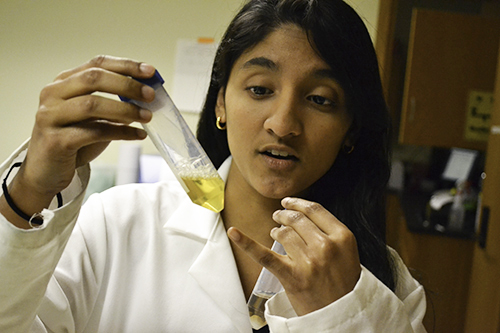
nano@illinois REU participant Rumya Raghavan
Eleven undergraduate students spent the summer working in the labs of some of Illinois' world-class researchers as part of the 10-week nano@illinois REU (Research Experience for Undergraduates). Not only did participants perform nanotechnology research, but they were challenged both professionally and personally as they learned new things about nanotechnology, about life in a research lab, and about themselves. As a result of their experience, some decided that graduate school might be in their future; some even considering careers in nanotechnology research.
Funded by the National Science Foundation, the nano@illinois REU, which ran from May 26–July 31, 2015, had several goals. One, according to Program Coordinator Carrie Kouadio, was to recruit participants from under-represented groups, which they did: of the 11 participants, 90% were under-represented students. Another goal, which they also achieved, was that the students would “consider graduate school in these areas that they’re studying," says Kouadio, who hoped that the summer experience would help students decide, "'Yes, I want to go to graduate school,’ and more importantly,‘Yes, I want to go in this area.’”
Mentored by both research professors and graduate students, students received in-depth training about their research subject, performed the research, and once their research experience was completed at summer's end, even developed and presented a poster about it at the Illinois Summer Research Symposium at the I-Hotel.
The nano@illinois REU collaborated with other campus REUs to provide quality programming, such as joint seminars, for the students. The REU also partnered with the Summer Research Opportunities Program (SROP), which provided evening seminars during which students received practical training on how to write research papers, give presentations, create posters, and develop CVs/resumes—particularly helpful for the rising juniors and seniors.
Rumya Raghavan
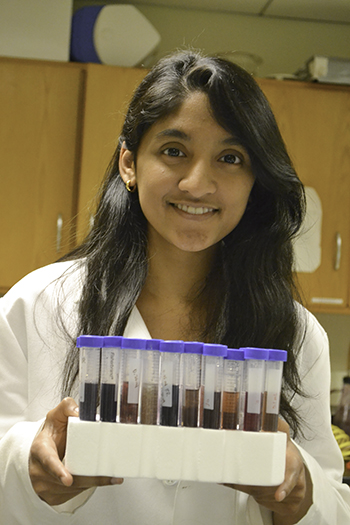 nano@illinois REU participant Rumya Raghavan displays samples of gold nanoparticles she worked with while doing research in Professor Rohit Bhargava's lab.
nano@illinois REU participant Rumya Raghavan displays samples of gold nanoparticles she worked with while doing research in Professor Rohit Bhargava's lab.One rising junior who especially appreciated the SROP seminars was Rumya Raghavan, a Bioengineering major at MIT. She says they were "really valuable in helping me structure my CV and resume, and to learn how to do deliver poster presentations." She also called them helpful for "discovering different ways in which people network."
An old hand at summer research programs, Raghavan has been doing research since the 8th grade, which she calls "definitely the first step in discovering my passion for research."
While some of her REU cohorts might switch to careers in research as a result of their summer experience, Raghavan claims that research has always been her goal:
"From a very young age, I've always been fascinated by the problem of cancer," she recalls. "So everything that I've done, every research project that I've taken up since then has been trying to get closer to reaching that goal of becoming a cancer researcher."
Raghavan's research this summer under Illinois researcher Rohit Bhargava was to modify the surface of gold nanoparticles to allow them to localize to the nucleus of cells; researchers hope to then use these gold nanoparticles as probes or even drug delivery agents in cancer therapy.
While she calls her work at MIT very biologically based, this summer's experience helped her realize the greater importance of multi-disciplinary research. "It’s forced me to think about more of the chemistry and the physics behind a lot of the different drug delivery mechanisms.”
In fact, Raghavan indicates that it was the multidisciplinary nature of this program that drew her to the nano@illinois REU:
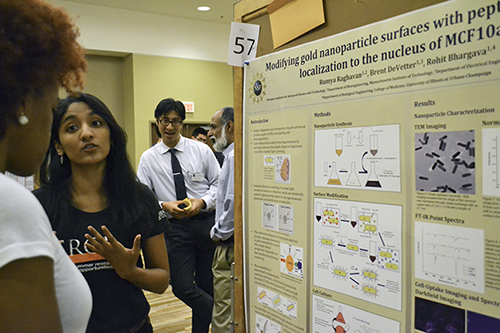 Rumya Raghavan presents her research on gold nanoparticles to a visitor to her poster session during the Illinois Summer Research Symposium.
Rumya Raghavan presents her research on gold nanoparticles to a visitor to her poster session during the Illinois Summer Research Symposium."I’ve always been fascinated with nanotechnology. I think bioengineers get so caught up in the biological aspects of it that they forget that there are many different engineering facets or skills you can put to use in biological systems. So I think it is important for biological engineers to learn the engineering aspects of it. I was really grateful for this program because it immersed me in parts of engineering that I wasn’t completely comfortable with.”
With its multidisciplinary emphasis, the experience has also helped her appreciate her many non-biology-related courses, during which she had probably asked herself, 'When am I ever going to be able to use this?'
"There’s so many different aspects of science that a single research project can draw upon," she explains. "It’s definitely helped me realize as a student, every single class and every single thing you learn is a valuable opportunity that you can apply to a future project. So all those chemistry courses and all those physics courses I took at the beginning of the year, I should’ve paid more attention to them! It’s definitely rewarding as a student to know that things that you are learning in class are applicable. It’s not a waste."
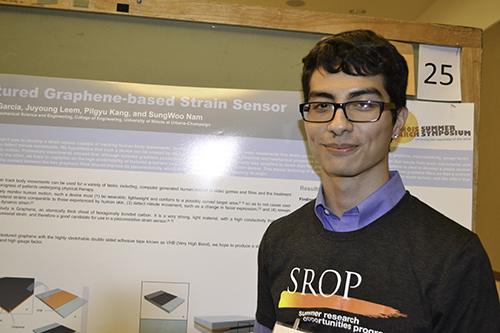
nano@illinois REU participant Ernesto Garcia
Ernesto Garcia
Ernesto Garcia, a junior in Mechanical Engineering at Illinois indicates that the experience this summer particularly helped improve his writing. “There were a lot of writing workshops that helped me a lot to strengthen my scientific writing. I think this is going to help me to be a better student as well as researcher. I’m sure my classes are going to require me to do some technical writing at some point, so that’s one of the biggest things that I’ve taken away.”
Garcia reports that the results of his research were positive: “We were able to develop a strength sensor that is capable of withstanding a large enough strength to be used on the human body.”
Did spending the summer researching technology that can track body movements impact his future career choice? Garcia, who will most likely go on to grad school, says maybe: “I’m definitely considering it now that I know more about it. I didn’t really know anything about it until I started this, so it’s something that I’ve become more interested in as a result.”
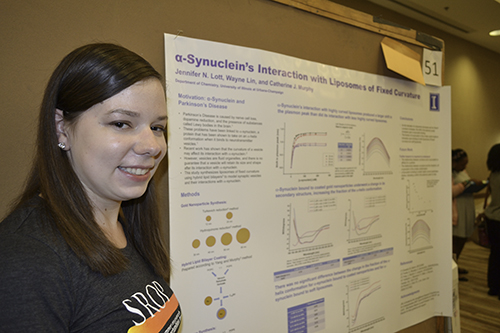 nano@illinois REU participant Jennifer Lott, a rising sophomore in Chemical Engineering at Carnegie Mellon University
nano@illinois REU participant Jennifer Lott, a rising sophomore in Chemical Engineering at Carnegie Mellon UniversityJennifer Lott
Jennifer Lott had never done any research before this summer and admits to being a bit nervous at first.
“I was a little hesitant coming into it because I hadn’t had any research experience,” she acknowledges. “But I liked a lot of the hands-on training and how understanding the program was that I didn’t have a lot of research experience.”
Did Lott feel that being one of the youngest students participating in the REU was a hindrance, or set her back in any way? “Not really, no,” she says. “My lab was very supportive of me in making sure that, even though I didn’t have the experience that other students may have, I still got the same training and the same attention and any help that I may have needed….My lab, my mentor, and my PI were very supportive of me, making sure that I always knew what I was doing and that I could ask for help without feeling nervous about it.”
In fact, Lott liked the experience so much that she wants to continue researching nanoparticles back at her home institution. “It has piqued my interest to continue doing research when I get back to CMU. It has sparked my interest in nanoparticles. That’s what I worked on here, and I really enjoy nanoparticles.”
In fact, the summer may even have changed the direction her career takes: “It has helped me direct my career interest towards a research-and-development-type career rather than a traditional chemical engineering career in process design.”
And because her career emphasis has now changed, it has also probably influenced her plans for her immediate future, which most likely now include grad school: “I’ve bounced that question back and forth a few times,” she continues. “I’ve always had an interest in pharmaceuticals, so I’m trying to compromise between wanting to go into pharmaceuticals but staying on the research side of that. So I’m considering a Master’s degree and a PhD so I can work in the research and development side of pharmaceuticals.”
Vesna Naumovski
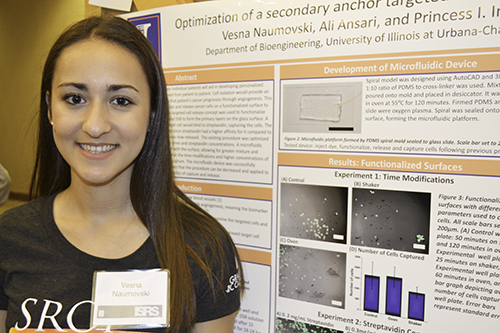 nano@illinois REU participant Vesna Naumovski, a rising senior in Biomedical Engineering at the Illinois Institute of Technology
nano@illinois REU participant Vesna Naumovski, a rising senior in Biomedical Engineering at the Illinois Institute of TechnologyVesna Naumovski indicates that while this wasn't her first research experience, her work in a laboratory setting over the past year was “not doing as intensive research as this,” she qualifies, “so it was more new to me.”
A member of the Imoukhuede research group, Naumovski was seeking to optimize a procedure that would enable greater capture of cancer cells on a surface; they found the optimal concentration and were able to incorporate this into a microfluidic device which allows for greater mixing and capture of cancer cells on a more uniform surface. The next step will be for researchers to “quantify the receptors of the cancer cells, which could lead to personalized cancer treatment,” she explains.
Doing cancer research wasn’t necessarily her dream prior to her REU, but it is now, “This is very interesting," she admits, "and I really hope to continue doing work in the cancer field.”
She acknowledges that participating in the REU also probably changed her mind about going into research: “I was on the fence about going to grad school coming into the program,” she admits, “but I’m definitely leaning towards doing grad school, so I’m at the point where I need to find what’s next and where to continue my research.”
What impact did the summer experience have on Naumovski as a student? “It definitely taught me a lot of things about balancing work, because there was a lot of work to do this summer, but at the same time I was in this new place and wanted to have time to go out and do different things, so I was able to do that as well.”
She's also realized that one’s undergraduate education is just a foundation. “When you continue on in your schooling, that’s when you learn so much more. I can’t believe how much I’ve learned in the past 10 weeks here.”
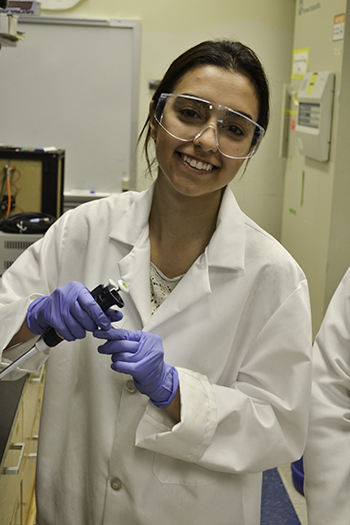 Nikou Pishevaresfahani, a rising junior at Illinois
Nikou Pishevaresfahani, a rising junior at IllinoisNikou Pishevaresfahani
REU participant Nikou Pishevaresfahani, a rising junior at Illinois studying Agricultural and Biological Engineering with a concentration in nanotechnology, worked in researcher Yi Lu’s lab, growing gold on palladium nanoparticles and looking at their properties.
Pishevaresfahani, who wants to go to medical school to become a pediatrician, joined the REU because she “definitely wanted to see the research aspect of medicine; some of…these particles have medical applications.”
Pishevaresfahani calls working with her grad student mentor her “favorite part,” but she also says “testing conditions and just doing experiments is fun. And being in the lab is definitely a different experience that I haven’t had before.”
Pishevaresfahani indicates that she learned a lot over the summer, and grew in several areas, not only academically and professionally, but also personally. What are some of the things she learned?
For one, how to do scientific writing: “It’s very different than any writing that I’ve done in the past,” she admits. “It’s very clear, and you have to be concise. You have to be direct and make sure the reader knows what you’re talking about even if they’ve never had any experience with nanoparticles before. So it’s been difficult in that way.”
Another aspect she grew in was making presentations; she attended weekly research team meetings for which she needed to prepare slides and present what she’d accomplished during the previous week. “So it’s been good,” she acknowledges, “because those people aren’t specifically in your major, and they don’t know what you are talking about all the time, so to be clear…we’ve had to work on it a lot.”
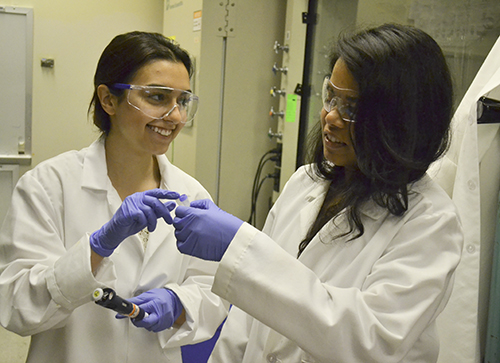 Left to right: Nikou Pishevaresfahani and her graduate student mentor discuss her research in Dr. Yi Lu's lab.
Left to right: Nikou Pishevaresfahani and her graduate student mentor discuss her research in Dr. Yi Lu's lab. What did she discover about research? Calling the REU her “first professional research experience," she says she’s learned that: “Everything has to be controlled,” and that “You have to keep redoing tests just to get significant results to make sure they’re reproducible.”
Pishevaresfahani says she’s also learned that sometimes an experiment fails, and the procedure must be repeated. Did failing throw her for a loop? “No,” she says. “You just have to keep going…You just do the procedure again and hope it works the second time around. If it doesn’t, just do it again.”
In fact, she said the experience personally taught her perseverance and problem solving—to “just persevere. Even though I can fail multiple times, I have to keep going, and there’s no going back. On some things you just have to produce your results to the best of your abilities, and you have to problem solve as well. It’s a big aspect of engineering and medicine.”
Author/Photographer: Elizabeth Innes, Communications Specialist, I-STEM Education Initiative
More: MNTL, nano@illinois , REU, REU: nano@illinois, Summer Research, Undergrad, Underserved Minorities, 2015
For additional istem articles about summer 2015 REUs, see:
- REU Undergrads Experience Research, What Graduate School Is Like
- 2015 EBICS REU Undergrads Are Exposed to the World of Research, Graduate School
- Summer Research Experience Exposes Undergrads to Bioimaging at Illinois
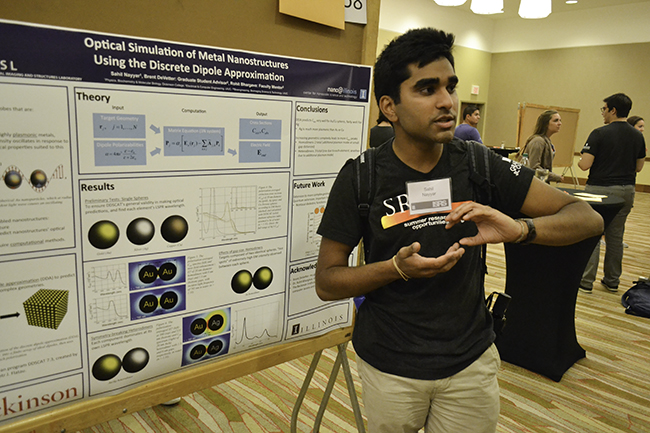
nano@illinois REU participant Sahil Nayyar explains his research on the Optical Stimulation of Metal Nanostructures to a visitor at the Illinois Summer Research Symposium poster session.













.jpg)
















